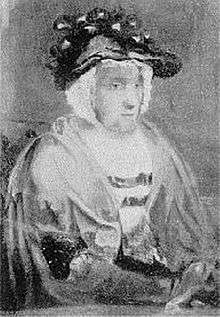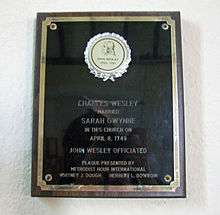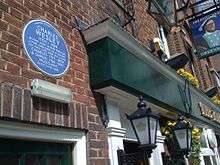Sarah Wesley
| Sarah Wesley | |
|---|---|
 "Sally" Wesley | |
| Born |
1726 Garth, Powys |
| Died | 28 December 1822 (aged 95–96) |
| Nationality | British |
| Children | Charles Wesley junior, Samuel Wesley and Sarah Wesley |
| Parent(s) | Marmaduke Gwynne and Sarah Evans |
Sarah Wesley also known as Sally Wesley born Sarah Gwynne (1726 – 28 December 1822) was the wife of itinerant Methodist Charles Wesley, brother of John Wesley, the main founder of Methodism. The daughter of a wealthy family, Wesley once performed musically for George III and passed this talent onto two of her sons, both of whom were musical prodigies.
Life
Sarah Wesley was born in Garth, Powys to Sarah (née Evans) and Marmaduke Gwynne. Marmaduke was a wealthy man and a committed Anglican who employed his own chaplain. A local magistrate, he went to arrest Howell Harris for stirring up sedition, but while listening to Harris' sermon was converted to his beliefs.[1] He brought Harris back to his house where his wife refused to see him. The only member of Gwynne's family who did listen was his daughter Sarah.[1]
By 1747 her father was offering accommodation to evangelical travellers and for five days in August he offered a place to stay to Charles and his brother John Wesley. The age gap between Sarah and Charles Wesley was nearly twenty years but they were both attracted to each other. Charles returned in the following April and proposed marriage.[2] Wesley's mother had been unenthusiastic about her husband's interest in the evangelical revolution that was taking place, but she was happy to see Charles Wesley become her son-in-law.[1]
Marriage

Charles and Sarah were married in 1749 at the small and lonely parish church at Llanlleonfel near Garth, which is 6 miles (10 km) west of Builth Wells.[3] The marriage was conducted by John Wesley, who had encouraged the union and guaranteed his brother an income of £100 per annum from book sales to reassure the Gwynne family of Charles financial position. This reassurance contrasted with the £600 a year that her mother had as her private income when she married Marmaduke Gwynne.[4]
In September 1749 the Wesleys moved into 4 Charles Street in Bristol which remained their main residence until 1771. This house is now preserved as "Charles Wesley's House". Charles was described as a "preacher at the horsefair" by St. James Church which was his place of worship. The churchyard holds the remains of five of Wesley's children (John, Martha Maria, Susannah, Selena and John James) who died as infants during the 22 years they lived in Bristol.[5]
The Wesley family were not known for their happy marriages but the marriage between Charles and Sarah seems to have been very happy. In 1753 Wesley suffered from smallpox, which was a disease that could be vaccinated against. Wesley had refused vaccination and although she survived the disease, the effects left her difficult to recognise.[4] Wesley took her own line on her religion and continued to attend the Calvinist church of George Whitefield who she would have met as a child when he stayed at her father's house.[2]

Sarah and Charles Wesley had a number of children but only three survived to be adults. The surviving children were Charles Wesley junior, Samuel Wesley and Sarah Wesley.[6] The two sons were musically gifted and made this their careers. Their mother was known for her musical abilities and including her singing voice which she was still using to entertain in her old age. Sarah senior had performed musically for King George III.[7]
After the death of her husband, Wesley was maintained by other Methodists including William Wilberforce. She died on 28 December 1818 and she was interred with her husband at St Marylebone Parish Church.[4]
Legacy
Wesley was painted in her lifetime and she has a contemporary portrait by David Keal; who also painted other members of her family.[8] The house that Charles and Sarah (aka Sally) had in Marylebone, London has now been demolished. Ironically the blue plaque that records the location of this couple's house, who were part of the temperant Methodist movement, is now attached to a public house.[9]
References
- 1 2 3 Marmaduke Gynne, National Library of Wales, retrieved 28 September 2013
- 1 2 The Wesley Family Papers 1685–1883, ArchiveHub, retrieved September 2013
- ↑ Llanlleonfel, Clwyd Powys Archaeological Trust, retrieved 28 September 2013
- 1 2 3 Henry D. Rack, 'Wesley, Charles (1707–1788)', Oxford Dictionary of National Biography, Oxford University Press, 2004; online edn, May 2012 accessed 29 Sept 2013
- ↑ Bristol Guide, englandschristianheritage, retrieved 1 October 2013
- ↑ Charles Wesley Family Collection, University of Texas Library, Retrieved 1 October 2013
- ↑ Clock and the Harpsichord, Charles Wesley House, retrieved 1 October 2013
- ↑ Paintings by David Keal at the Art UK site
- ↑ File:Charles Wesley (4368240967).jpg, Geolocation, retrieved 1 October 2013